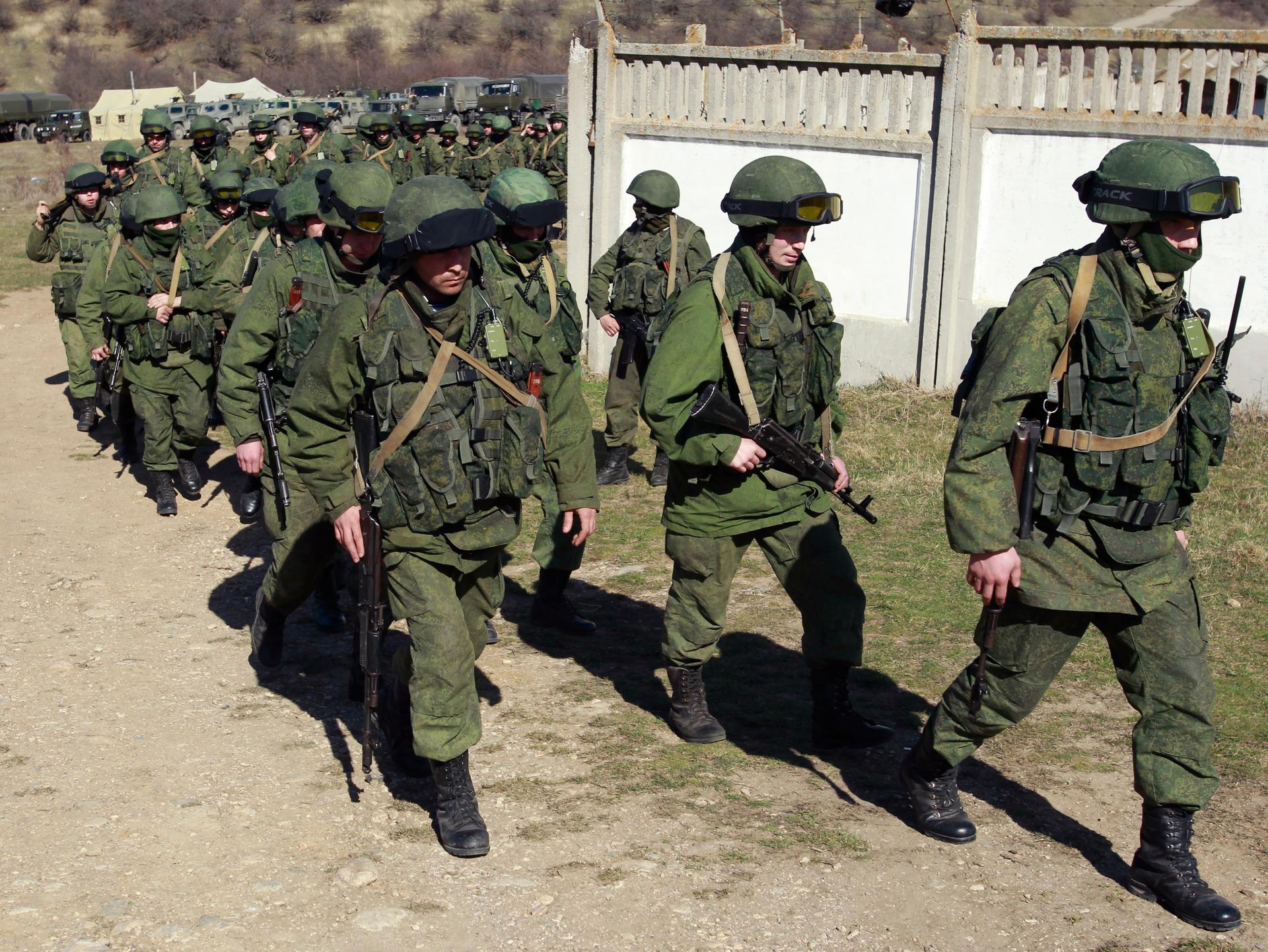Ukraine is fast becoming the biggest European crisis of this century
Military personnel, believed to be Russian servicemen, walk in formation outside the territory of a Ukrainian military unit in the village of Perevalnoye outside Simferopol March 3, 2014.
The confrontation between Russia and Ukraine continued Monday. Ukrainian officials and some journalists say Russia demanded that two Ukrainian naval ships surrender by 5 a.m. local time or face an attack. Russian officials denied making any such demands.
Secretary of State John Kerry is being dispatched to Kiev to reassure the new government of US support. He told ABC's George Stephanopoulos Monday that “all options are on the table” when it comes to steps the US can take to hold Russia accountable for its military movements in Ukraine. Russia's moves in Crimea have challenged President Barack Obama in a way that no other international crisis has so far.
“It’s the most important, most difficult foreign-policy test of his presidency,” said R. Nicholas Burns, a career diplomat and undersecretary of state during the George W. Bush administration, according to The New York Times. “The stakes are very high for the president because he is the NATO leader. There’s no one in Europe who can approach him in power. He’s going to have to lead.”
The situation represents one of the greatest political and diplomatic tests for the international community in years. A Russian envoy to the United Nations told the world body that his country was acting at the behest of deposed Ukrainian President Viktor Yanukovych, who sent a letter to Putin asking for Russian military intervention in Ukraine, Reuters reported.
"It is certainly the biggest crisis in Europe in the 21st Century and it will require all our diplomatic efforts, but also a great deal of strength in the Western world in order to deal with this satisfactorily," British Foreign Secretary William Hague told the BBC.
The divisions in Crimea are "extremely tense," says Natalia Antelava, a reporter in Ukraine, because the population of Crimea is very diverse. About 60 percent of Crimeans are ethnically Russian, about 15 percent are of the indigenous Crimean Tatar population, and there's a large Ukrainian population, as well. Antelava attended a demonstration Sunday and said an argument broke out between the groups, with some supporters of Russian President Vladimir Putin calling for the ouster of the indigenous Crimean Tatar population, while others denounced ethnic Ukrainians.
"The divisions amongst them are quite extraordinary and deepened by the presence of the Russian troops," Antelava says. "There are people who are very worried that the presence of Russian troops will upset this very delicate ethnic balance here, and you can really feel that tension already."
Antelava says that people on the ground fear they will be the victims of a larger international game that is playing out in Crimea. "I think people realize very clearly that unless they manage not to allow outsiders to provoke them against each other, this is going to end very, very badly," she says.
Antelava adds that she has already seen this to some extent. At a gas station on Sunday, an ethnic Tatar man was distraught about what the future held for his family and said his Russian neighbors were turning against him.
"Many people are saying — including some ethnic Russians — that because of the presence of the Russian troops, that all of this has really amplified," she says. "A lot of people I have been speaking to are very aware of how fragile the situation is."
Antelava says Russian troops have been taking over various military bases around Crimea during the last 48 hours. "At some of these bases, there have been standoffs," she says. "Probably the Ukrainian Army will surrender because not allowing Russians into those bases will end up in bloodshed."
Steven Pifer, a former U.S. ambassador to Ukraine from 1998 to 2000 and a senior fellow at the Brookings Institution, says unlike the situation in Georgia in 2008, there has been no threat to ethnic Russians in Crimea or to Russia's military installations.
"It looks like this was a manufactured crisis," he says. "There were a series of things that looked as if they were designed to provoke a Ukrainian military response in Crimea, and when the Ukrainians did not respond, the Russians just went in on their own."
Echoing the sentiments of British Foreign Minister Hague, Pifer says this is a huge crisis for Europe. He says Russia has "basically torn up the rule book." He adds that while many thought Russia would try to take steps to destabilize the new Ukrainian government through economic means, no one was expecting military intervention.
"I think people were caught off guard that Mr. Putin leaped over [economic sanctions] and went right for that military intervention in Crimea," he says.
In 1954, the Soviet Union transferred Crimea from Russia to Ukraine. Pifer says the area, with its large ethnic Russian population, is still viewed by many as part of Russia.
"I think with Vladimir Putin, you have somebody who is not looking at Ukraine in those terms. You're looking at somebody who really does want to extend Russian influence in the post-Soviet space," Pifer says. "He is now showing that he is resorting to means that people did not expect to push that ambition."
Pifer says what is happening in Crimea now is absolutely a Russian military occupation.
"If Mr. Putin goes beyond that, there are big risks for Russia," he says. "A Russian military intervention in Eastern Ukraine would lead to a situation where some Ukrainian military units would fight, there would be Ukrainian nationalists from western Ukraine who I believe would head east and conduct basically a guerrilla war.
"It could be very nasty for Russia, and my hope is that the Russian military understands this and is telling Mr. Putin, 'This is not something we want to get into.'"
